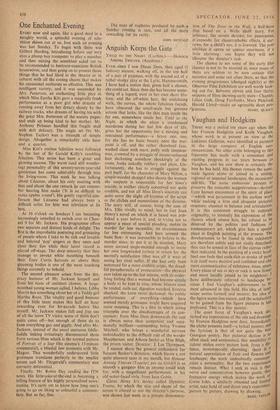Anguish Keeps the Gate
YIELD TO THE NIGHT. (Carlton.)—HONOUR AMONG THIEVES. (Academy.) EVER since I saw Diana Dors, then aged (1 believe) sixteen, walking off, in the top half of a pair of pyjamas, with the second act of a rather stodgy play at the Lyric. Hammersmith, 1 have had a notion that, given half a chance, she could act. Since then she has become some- thing of a legend, even in her own short -life- time, and the off-white hair, the undulating walk, the curves, the whole fabulous façade, have obscured the small-scale but genuine actress that lurks, like the thin man inside the fat one, somewhere inside her. Yield to the Night, in which she plays a condemned murderess during her last few days of life, gives her the opportunity for a moving and restrained performance—a brave one, too, for she has no basic beauty once the war- paint is off, and the rather rhomboid face, washed clean with tears, puffy with sleepless- ness, crowned by a straggle of mouse-coloured hair darkening somehow shockingly at the roots, looks nakedly rubbery and plain. Un- fortunately, she has to struggle against the part itself, for the character of Mary Hilton. a simple-minded shopgirl who shoots the woman she suspects is responsible for her lover's suicide, is neither clearly conceived nor quite credible, and not all Miss Dors's sincerity can quite cover the slight off-keyness of the script or the cliches and mannerisms of the director. The story will, of course, bring the case of Mrs. Ellis vividly to mind; but in fact Joan Henry's novel on which it is based was pub- lished a year before it, and, in trying not to appear a piece of special pleading. makes its murder, far less excusable, its circumstances far less extenuating. And here seemed the basic flaw : it was impossible to believe in the murder since, to put it at its simplest, Mary never seemed single-minded enough to invite her own longwinded torture in return for the second's satisfaction (that was all it was) of seeing her rival suffer. If she had only been sentenced for a more credible crime, the dread- ful paraphernalia of preparation—the physical care taken up to the last minute, with its under- lying feeling that a woman had become simply a body to be kept in trim, whose blisters must be tended, nails cut, digestion watched. hysteria checked: the lamp never darkened: the public performance of everything—which here seemed merely grotesque, might have acquired more meaning. This is a film in which acting triumphs over the disadvantages of its con- ception: from Miss Dors downwards the cast is always more than competent and occa- sionally brilliant—outstanding being Yvonne Mitchell, who brings a wonderful nervous individuality to the difficult role of the warder Macpherson, and Athena Seyler as Miss Bligh, the prison visitor. Director: J. Lee Thompson.
I cannot share the general enthusiasm for Jacques Becker's direction, which leaves a not quite pleasant taste in my mouth, but Honour Among Thieves (Toucher pas an Grishi) is as smooth a gangster film as anyone could wish for, with a magnificent performance. in his old noker-faced style. from Jean Gahin.
Glenn Alvey Jr's device called Dynamic Frame, by which the size and shape of the screen is altered to suit the director's purpose. was shown last week in a private demonstra-
Con, of The Door in the Wall, a half-hour film based on a Wells shat story. For intimacy, the screen shrinks; for panoramas, it expands; for claustrophobic effects, it nar- rows; for a child's eye, it is lowered. The pos- sibilities it opens up appear enormous, if a little alarming: one hopes they will not cheapen the director's task.
. The chance to see some of the early film classics is not to be sneezed at, since many of them are seldom to be seen outside film societies and some not often there, so that the evening programmes (changed nightly) at the Observer Film Exhibition are well worth look- ing out for. Between eleven and four thirty, snippets of films showing early stars—Chaplin, Lilian Gish, Doug Fairbanks, Mary Pickford, Harold Lloyd—make an agreeable short pro- "-gramme. ISABEL QUIGI.Y


































 Previous page
Previous page